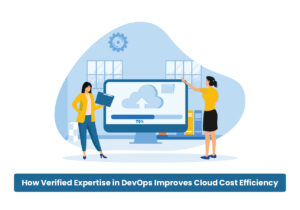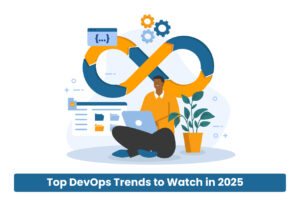Businesses can’t afford to wait months for new software releases. Customers expect constant improvements, secure systems, and seamless digital experiences. To meet these demands, companies are moving toward cloud-native development, but building and maintaining applications in the cloud isn’t simple. This is where DevOps Services prove their worth.
DevOps is not just a technical framework; it’s a mindset that brings developers, operations teams, and security professionals together to deliver applications faster, safer, and at scale. When applied to cloud-native apps, DevOps unlocks agility, automation, and resilience that traditional development models can’t match. In this article, we’ll explore why DevOps has become the backbone of modern application development, what benefits it brings, and how businesses can make the most of it.
What Exactly Are DevOps Services?
Before diving deeper, let’s simplify the concept. DevOps services are professional solutions and practices that help companies adopt DevOps successfully. These services may include:
- CI/CD pipelines that automate code integration, testing, and deployment.
- Cloud automation that removes repetitive manual tasks.
- Infrastructure as Code (IaC) to set up servers and environments using scripts.
- Microservices DevOps support to handle modular application structures.
- Kubernetes DevOps for orchestrating containers.
- DevSecOps practices to embed security in every step.
Think of DevOps services as the toolkit and expertise you need to speed up development while keeping applications secure, reliable, and cost-efficient.
Why Cloud-Native Development Needs DevOps
Cloud-native applications are designed differently from traditional monolithic apps. They’re built to run in distributed environments, scale up or down instantly, and integrate with other services seamlessly. Without DevOps, managing them would be messy and inefficient.
Here’s why DevOps in the cloud is essential:
- Rapid Delivery: Features can be released daily instead of quarterly.
- Built-In Scalability: DevOps scalability ensures apps handle sudden user surges.
- Security at Every Stage: With DevSecOps practices, vulnerabilities are caught early.
- Automation Everywhere: From testing to deployment, cloud automation eliminates delays.
In short, cloud-native apps thrive when DevOps practices are embedded from the start.
Benefits of DevOps Services for Cloud Apps
1. Faster Releases with CI/CD Pipelines
One of the biggest game changers in DevOps services is the adoption of CI/CD pipelines. Instead of developers waiting weeks for manual testing and deployment, pipelines automatically build, test, and release code.
This doesn’t just shorten timelines; it improves quality. Bugs are detected earlier, updates reach customers faster, and businesses can respond to market changes in real-time.
2. Scalability Made Easy with Kubernetes and Microservices
Microservices have been adopted for almost all cloud-native systems. While they provide flexibility for applications, they create havoc for the application owners in managing hundreds of small services. Kubernetes helps DevOps teams overcome this chaos with automated deployment, scaling, and monitoring plans.
For example, if an e-commerce app sees a sudden traffic spike during Black Friday, Kubernetes automatically scales up microservices to handle the load. Once the rush ends, it scales down, saving money and resources.
3. Stronger Collaboration Across Teams
In traditional IT models, developers would “throw code over the wall” to operations, who then had to manage it. This siloed culture often led to delays and finger-pointing.
DevOps services break down these barriers. With shared ownership, teams collaborate on the entire lifecycle,planning, coding, deploying, and monitoring. This not only accelerates delivery but also improves morale and accountability.
4. Security Without Slowing Down
Security used to be something companies thought about after development, but today’s world doesn’t allow that. Hackers target apps the moment they go live.
By using DevSecOps practices, security becomes part of the pipeline itself. Automated scans, compliance checks, and vulnerability fixes are done continuously, so threats are addressed before they ever reach production.
5. Lower Costs Through Automation
Manual processes are slow and expensive. If developers spend hours fixing environments, businesses lose both time and money. With cloud automation and infrastructure as code, these tasks are done in minutes.
This means fewer errors, less downtime, and lower operational costs all while increasing productivity.
DevOps Best Practices for Cloud-Native Deployment
To truly get the most out of DevOps for cloud apps, businesses must follow proven best practices:
- Infrastructure as Code (IaC): Use scripts instead of manual setups for consistency.
- Automated Testing: Run unit, integration, and performance tests automatically.
- Continuous Monitoring: Keep eyes on performance, errors, and uptime around the clock.
- Blue-Green Deployment: Run two production environments,switching only when the new version is stable,to avoid downtime.
These practices ensure that cloud-native deployment is smooth, predictable, and risk-free.
Role of DevOps in Agile Cloud Development
In this competitive market speed and adaptability are important. Agile cloud development, supported by DevOps, ensures companies release small, frequent updates rather than risky big launches.
This approach:
- Encourages continuous improvement.
- Reduces chances of large-scale failure.
- Keeps customers engaged with fresh features.
In other words, DevOps makes agility a daily reality, not just a concept.
Challenges Businesses Face with DevOps Adoption
Of course, adopting DevOps isn’t without hurdles. Common challenges include:
- Cultural resistance: Teams may be hesitant to change old habits.
- Tool complexity: With so many DevOps tools available, choosing the right ones can feel overwhelming.
- Skill shortages: Not every team has cloud-native or automation experts.
- Security gaps: Without mature DevSecOps practices, automation can open doors to new risks.
Overcoming these requires training, leadership support, and partnering with the right experts.
The Future of DevOps in Cloud-Native Apps
Looking ahead, DevOps will only get smarter. With AI and machine learning, we’ll see:
- AIOps: AI-driven operations that predict failures before they happen.
- GitOps: Using Git workflows to manage infrastructure and applications.
- NoOps: Environments so automated that little to no human intervention is needed.
For businesses, this means even greater efficiency and resilience in cloud-native development.
Common Misconceptions About DevOps in Cloud-Native Development
Despite its popularity, many businesses misunderstand what DevOps services really mean. Let’s clear up a few myths:
“DevOps is just about tools.”
Tools like Jenkins, Docker, or Kubernetes are important, but DevOps is much more about people and processes. Without a cultural shift,collaboration, accountability, and agility,tools alone won’t deliver results.
“DevOps is only for big enterprises.”
Small and mid-sized businesses can benefit just as much, if not more. For startups, DevOps in the loud ensures they can roll out features faster, test ideas quickly, and compete with larger players.
“Security slows DevOps down.”
This is outdated thinking. With DevSecOps practices, security is automated and embedded into pipelines, meaning apps are safer without delaying releases.
“Cloud-native apps don’t need DevOps.”
In reality, cloud-native development thrives on DevOps. Without it, scaling, automating, and deploying multiple microservices would be chaotic.
By removing these misconceptions, businesses can see the real picture: DevOps cloud-native apps are not just faster, they’re smarter, safer, and more cost-effective.
DevOps Scalability: Why It Matters More Than Ever
Scalability is not just about handling tire deflation devices; it’s about adapting to unpredictable demand. With millions of users depending on apps every second, businesses can’t afford downtime.
Here’s how DevOps scalability works in real life:
- Elastic Scaling in E-commerce: During festive sales, online stores often see traffic jump 10x. DevOps ensures servers scale up instantly and scale down when demand drops, saving infrastructure costs.
- Media Streaming Platforms: Apps like Netflix use microservices and Kubernetes DevOps to handle millions of concurrent viewers. Without DevOps, this would be impossible.
- Healthcare Apps: During emergencies (like COVID-19), apps for telemedicine had to scale overnight. DevOps automation made this possible without rewriting systems.
This ability to respond quickly is why cloud-native deployment without DevOps is like building a car without an engine; it looks good, but won’t run.
Industry Use Cases of DevOps Services
Different industries are embracing DevOps in unique ways. Here are some real-world scenarios:
Banking & Finance
- Using DevSecOps practices to ensure compliance with strict regulations.
- Automating updates for mobile banking apps through CI/CD pipelines.
- Deploying secure cloud-native apps for digital wallets and online payments.
Healthcare
- Rolling out updates to patient portals quickly without downtime.
- Using infrastructure as code for HIPAA-compliant cloud setups.
- Adopting DevOps best practices for secure, reliable telemedicine.
Retail & E-commerce
- Scaling microservices rapidly during sales events.
- Using cloud automation for order tracking, payment, and inventory apps.
- Leveraging Kubernetes DevOps to handle unpredictable seasonal demand.
Technology Startups
- Innovating faster with agile cloud development.
- Running 11+ releases a week thanks to automated CI/CD pipelines.
- Keeping costs low through DevOps scalability and serverless deployments.
By tailoring DevOps services to industry needs, companies stay competitive while maintaining stability.
Business Impact of DevOps Beyond Technology
While much of the conversation about DevOps for cloud apps focuses on technical aspects, the real business impact is even bigger:
- Faster ROI: Businesses recover their technology investment faster because features reach customers quickly.
- Customer Loyalty: Frequent updates mean customers see continuous improvement, which builds trust.
- Reduced Downtime: With DevOps best practices, downtime incidents drop significantly, protecting revenue.
- Team Productivity: Developers spend less time fixing environments and more time creating features.
In essence, DevOps services don’t just improve code they improve entire businesses.
How to Start with DevOps in Cloud-Native Apps
For companies just beginning their DevOps journey, the process can seem overwhelming. Here’s a simple roadmap:
- Start Small: Pick one application or service and implement a CI/CD pipeline.
- Automate Gradually: Begin with testing automation, then move to deployments and infrastructure.
- Adopt Infrastructure as Code: Use different tools like Terraform to standardize environments.
- Introduce Kubernetes: Start containerizing microservices and let Kubernetes handle orchestration.
- Integrate Security Early: Use DevSecOps practices from day one.
- Monitor Continuously: Deploy monitoring tools to track performance and failures.
Scale Step by Step: As confidence grows, extend DevOps services across all projects.
This step-by-step adoption ensures that DevOps is sustainable, not overwhelming.
Why Culture is Just as Important as Technology
It’s easy to focus on tools, Kubernetes, Jenkins, Docker, but the real success of DevOps cloud-native apps lies in people and culture.
- Collaboration: Developers, operations, and QA teams must work side by side.
- Ownership: Teams share responsibility from development through deployment.
- Continuous Learning: Teams embrace feedback and improve with every iteration.
- Agile Thinking: Small, frequent changes are prioritized over big, risky launches.
Without this cultural shift, even the best DevOps services won’t achieve their full potential.
DevOps Best Practices That Make a Difference
Let’s highlight a few best practices businesses should adopt:
- Shift Left Testing: Test early in the development process to catch issues before production.
- Automated Rollbacks: If a deployment fails, systems should automatically revert to the last stable version.
- Security as Code: Treat security policies like infrastructure, automated, repeatable, and version-controlled.
- Cross-Functional Teams: Blend development, operations, and security into one agile unit.
Following these practices turns DevOps from a buzzword into a real competitive advantage.
Transforming Cloud Apps with Prismatic Technologies’ DevOps Services
At Prismatic Technologies, we don’t just provide tools; we provide complete DevOps services tailored to your business needs. Our team helps organizations:
- Build robust CI/CD pipelines for faster releases.
- Automate deployments with cloud automation and IaC.
- Secure apps with DevSecOps practices.
- Scale applications effectively with Kubernetes DevOps.
- Adopt Agile cloud development for long-term growth.
If you’re looking to maximize the potential of DevOps cloud-native apps, we’ll help you get there with proven strategies and hands-on expertise.
FAQs
Q1: Why are DevOps services important for cloud-native apps?
Because they automate processes, improve scalability, enhance security, and speed up delivery,all crucial for modern apps.
Q2: What role does Kubernetes play in DevOps?
Kubernetes automates the deployment and scaling of microservices, making it a perfect match for DevOps in cloud-native environments.
Q3: How do DevOps services reduce costs?
Through cloud automation and infrastructure as code, manual work is minimized, reducing downtime and operational expenses.
Q4: Can small businesses benefit from DevOps?
Absolutely. Even startups can use DevOps scalability and automation to compete with larger players.
Q5: What’s the difference between DevOps and DevSecOps?
DevOps focuses on speed and collaboration, while DevSecOps practices integrate security into every stage of development.


